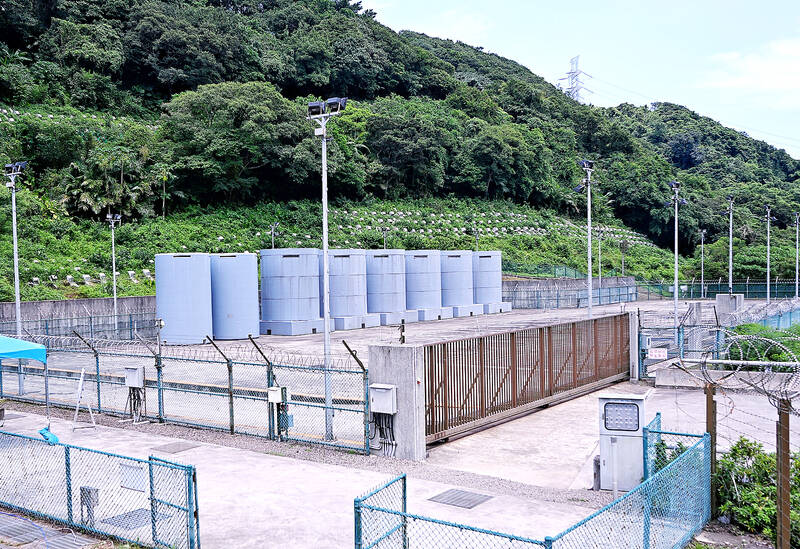Taiwan Power Co (Taipower, 台電) and the New Taipei City Government have struck a deal to allow the activation of the Jinshan Nuclear Power Plant’s spent fuel storage facility, ending an 11-year legal battle, the state-owned electricity company said yesterday.
The dry storage facility, which was designated to be used for the disposal of materials from the deactivated plant in the city’s Shihmen District (石門), could not be completed since the city government had not approved its water and soil conservation plans and delayed the completion date.
Last month’s earthquake in Hualien, which measured 7.2 on the Richter scale, has underscored the dangers of storing spent fuel in reactor cooling pools and the need to build dry storage facilities that can hold high-level radioactive waste, Taipower said in a news release.

Photo: Fang Pin-chao, Taipei Times
The company reached a mediated settlement with the city government on April 1 and submitted relevant documents on April 18 for approval, it said.
The improvements to the facility’s retaining walls and drainage systems would begin a month after the publication of the construction notice, Taipower said.
The improvements would be finished in three months and following that, the storage facility would be activated in four to six months, it said.
Plans for another dry storage facility for the Guosheng Nuclear Power Plant in New Taipei City’s Wanli District (萬里) are stuck in legal limbo, Taipower said.
Taipower hopes to achieve an agreement with the city government regarding the power plant, it added.
The Jinshan plant’s storage facility could not be used for storing the Guosheng plant’s spent fuel due to difficulties in transporting high-level radioactive waste and the legal problems that changing the stated purpose of the storage site might cause, Taipower said.
The most significant issue with nuclear energy is safety, and the city government took time during negotiations to ensure that no danger would stem from the facility’s proximity to river systems and the stability of the grounds, New Taipei City Deputy Mayor Liu Ho-jan (劉和然) said.
The city government hopes that Taipower would build the storage facility according to the specifications and furnish the water and soil conservation plan on time, Liu said.
Minister of Economic Affairs Wang Mei-hua (王美花) said that the ministry supports the negotiations.
For public safety reasons it necessary to ensure that spent fuel rods could be removed from the nuclear power plant, Wang said.
The ministry is mediating the dispute between Taipower and the New Taipei City Government over the proposed dry storage facility for the Guosheng Nuclear Power Plant, she said.
Taipower is not able to begin the construction of the nuclear waste depository due to the disagreement, Wang said.
The ministry hopes to resolve it soon, she added.

Actor Darren Wang (王大陸) was questioned by prosecutors for allegedly orchestrating an attack on a taxi driver after he was allegedly driven on a longer than necessary route in a car he disliked. The questioning at the New Taipei City District Prosecutors’ Office was ongoing as of press time last night. Police have recommended charges of attempted murder. The legally embattled actor — known for his role in the coming-of-age film Our Times (我的少女時代) — is under a separate investigation for allegedly using fake medical documents to evade mandatory military service. According to local media reports, police said Wang earlier last year ordered a

CAUTION: Based on intelligence from the nation’s security agencies, MOFA has cautioned Taiwanese travelers about heightened safety risks in China-friendly countries The Ministry of Foreign Affairs (MOFA) yesterday urged Taiwanese to be aware of their safety when traveling abroad, especially in countries that are friendly to China. China in June last year issued 22 guidelines that allow its courts to try in absentia and sentence to death so-called “diehard” Taiwanese independence activists, even though Chinese courts have no jurisdiction in Taiwan. Late last month, a senior Chinese official gave closed-door instructions to state security units to implement the guidelines in countries friendly to China, a government memo and a senior Taiwan security official said, based on information gathered by Taiwan’s intelligence agency. The

Taiwan Semiconductor Manufacturing Co (TSMC), the world’s largest contract chipmaker, said yesterday that it is looking to hire 8,000 people this year, at a time when the tech giant is expanding production capacity to maintain its lead over competitors. To attract talent, TSMC would launch a large-scale recruitment campaign on campuses across Taiwan, where a newly recruited engineer with a master’s degree could expect to receive an average salary of NT$2.2 million (US$60,912), which is much higher than the 2023 national average of NT$709,000 for those in the same category, according to government statistics. TSMC, which accounted for more than 60 percent

President William Lai (賴清德) should protect Taiwan Semiconductor Manufacturing Co (TSMC), and stop supporting domestic strife and discord, former president Ma Ying-jeou (馬英九) wrote on Facebook yesterday. US President Donald Trump and TSMC on Monday jointly announced that the company would invest an additional US$100 billion over the next few years to expand its semiconductor manufacturing operations in the US. The TSMC plans have promoted concern in Taiwan that it would effectively lead to the chipmaking giant becoming Americanized. The Lai administration lacks tangible policies to address concerns that Taiwan might follow in Ukraine’s footsteps, Ma wrote. Instead, it seems to think it could